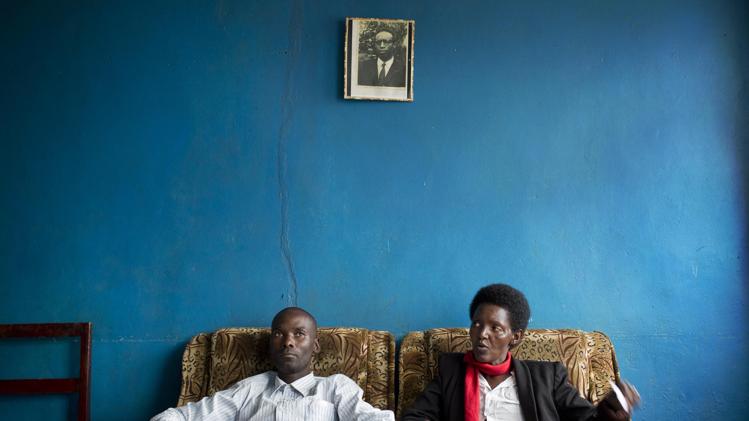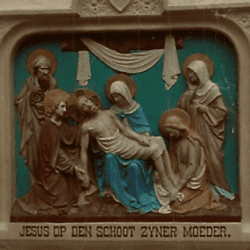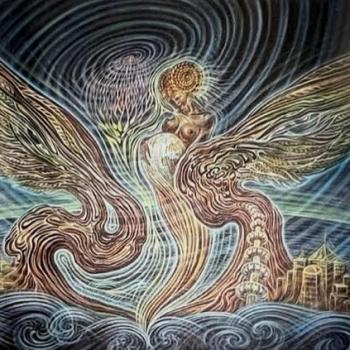Holy, holy, holy. Beauty and blessing beyond my ability to comprehend. As a progressive Christian, embracing doubt is an essential part of my faith. It’s integral to avoiding religion at its worst, at its most over-stated, and at its most dysfunctional. But there are bits of reality that come crashing into my healthy skepticism that leave me thinking … “I guess there really is a God.”
This week marks the 20th anniversary of the beginning of 100 days of bloody mayhem and genocide in Rwanda.
In this photo taken Wednesday, March 26, 2014, Emmanuel Ndayisaba, left, and Alice Mukarurinda, recount their experiences of the Rwandan genocide as they sit under a photograph of Alice’s father, who was elsewhere at the time and also managed to survive, at Alice’s house in Nyamata, Rwanda. She lost her baby daughter and her right hand to a manic killing spree. He wielded the machete that took both. Yet today, despite coming from opposite sides of an unspeakable shared past, Alice Mukarurinda and Emmanuel Ndayisaba are friends. She is the treasurer and he the vice president of a group that builds simple brick houses for genocide survivors. They live near each other and shop at the same market. Their story of ethnic violence, extreme guilt and, to some degree, reconciliation is the story of Rwanda today, 20 years after its Hutu majority killed more than 1 million Tutsis and moderate Hutus. The Rwandan government is still accused by human rights groups of holding an iron grip on power, stifling dissent and killing political opponents. But even critics give President Paul Kagame credit for leading the country toward a peace that seemed all but impossible two decades ago. (AP Photo/Ben Curtis)
—
This news story blew me away. It didn’t make the front pages of any newspapers – and there are currently only 2 articles about this story on the internet. But this is a story that needs to be known by as many of our fellow humans as possible. This story conveys the epitome of the truths of many of the world’s major religions – and perhaps especially the world’s largest religion, Christianity.
Here’s a link to a piece that provides the full back-story to this incredible feat of grace and humanity at it’s best – in the context of humanity at its worst. An excerpt:
…In the months after the genocide, guilt gnawed away at Emmanuel. He saw his victims during nightmares. In 1996, he turned himself in and confessed.
His prison term lasted from 1997 until 2003, when Kagame pardoned Hutus who admitted their guilt. After he was freed, he began asking family members of his victims for forgiveness. He joined a group of genocide killers and survivors called Ukurrkuganze, who still meet weekly.
It was there that he saw Alice, the woman he thought he had killed.
At first he avoided her. Eventually he kneeled before her and asked for forgiveness. After two weeks of thought and long discussions with her husband, she said yes.
“We had attended workshops and trainings and our hearts were kind of free, and I found it easy to forgive,” she says. “The Bible says you should forgive and you will also be forgiven.”
What would our world be like if more people of faith, and more people in general, could find ways to question authority, think for themselves, and feel empowered to deeply contemplate the true commitments and teachings that they value the most? What would humanity be like if more of us could be equipped to avoid the perilous quicksand of hate, vengeance, and retribution and to more readily embrace the firm foundations of forgiveness, compassion, unconditional love, and reconciliation?
Pondering these questions isn’t asking something that is naive, pollyannish, or impossible. Alice and Emmanuel are living proof that such a world is not only possible – they’re residing in such a world here and now.
xx Roger
Rev. Roger Wolsey is an ordained United Methodist pastor who directs the Wesley Foundation at the University of Colorado at Boulder, and is author of Kissing Fish: christianity for people who don’t like christianity













